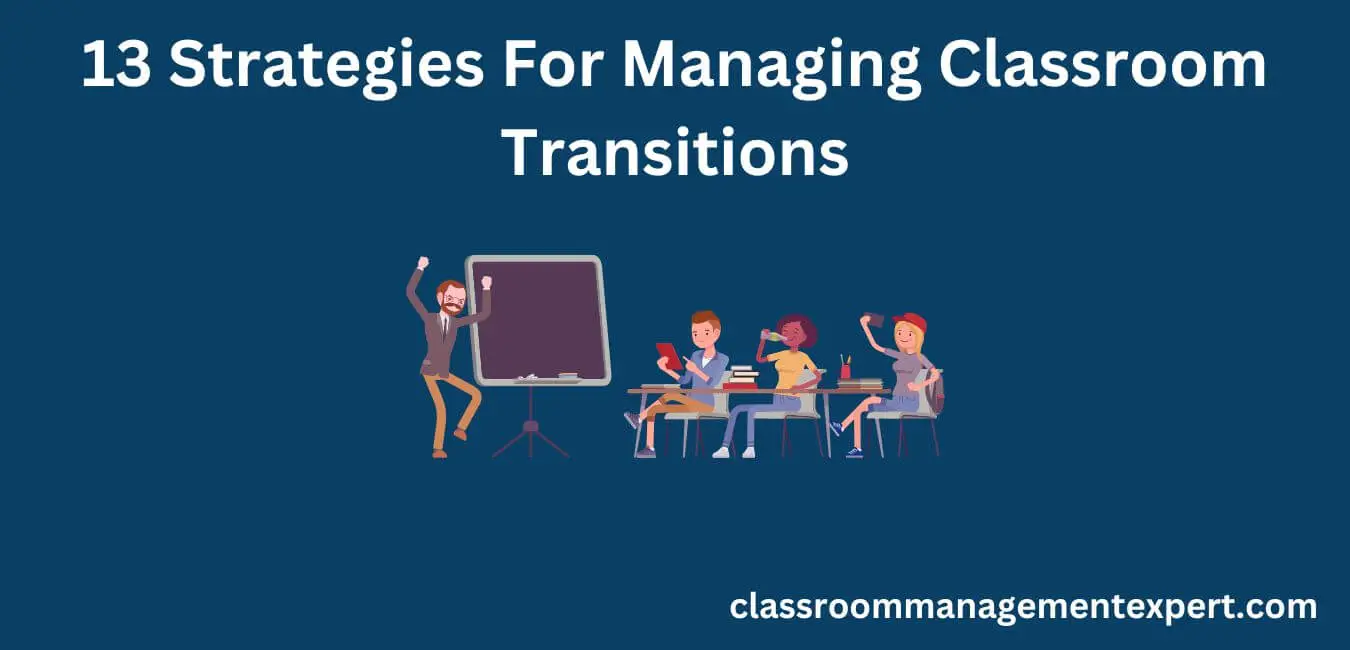One of the main goals of education is to promote life-long learning. Thus, education should be able to motivate individuals to continue learning throughout their lives, even outside the classroom.
So, as a teacher, you should be striving to enhance the development of life-long learning among your students. There is evidence in education literature that supports the idea that classroom management plays a key role in helping teachers achieve optimal learning in their classrooms.
In light of this, I think it is important for us to assess the importance of effective management of students’ classroom behavior.
To do an appropriate analysis, it is essential to look at the importance of classroom management to the teacher, the student, and the rest of the stakeholders of education. This way you will be able to understand the trickle-down benefits of effective management of the classroom from the teacher to the entire society.
Importance of Effective Classroom Management to the Teacher
Teachers consider pupils’ behavior management as one of the top stressors in their profession. For example, Richard Ingersoll (2001) found that approximately 30% of the 400 who left the teaching profession cited pupil management as one of the reasons why they gave up, in a study of approximately 6700 teachers in the United States.
An earlier study by David Chan (1998) revealed that teachers rated pupil behavior management as the second most stressful factor for teachers, in a survey of 400 teachers on what stresses them. You can check here to see why classroom management is so hard for some teachers.
1. It helps create a conducive learning environment
If you have exceptional strategies to help you manage your classroom effectively, then these strategies will help you create an enabling and conducive environment for your students to learn effectively. For example, Daniel Goleman said that;
“The Responsive Classroom approach creates an ideal environment for learning–every teacher should know about it.”
That is to say that your classroom management skills can help you to create a favorable environment that will give all your students a sense of belongingness so that they will feel free to explore more learning opportunities within the boundaries and standards established by collaborated efforts between you and your students.
This is possible if you have a well-thought-out plan to manage the behavior of your students and your classroom.
On the other hand, if you don’t have a plan in place to manage your lessons and the behavior of your students in the classroom, there will be chaos which makes your classroom environment not suitable for effective learning.
In this environment, your students will learn much less than they could if you had managed the classroom effectively.
Find our strategies on how to handle students you don’t like here.
2. It helps avoid waste of time and energy
You need a proper classroom management strategy to guide all things that happen in the classroom within the day. It is often helpful to pre-plan your lesson taking into account classroom management issues such that possible misbehaviors during the lesson will not limit you from helping your students to effectively grasp what you are going to teach.
That is to say, before a student puts up behavior in your class during a lesson, your plan of managing the class can help you to quickly deal with that behavior and move on with the lesson.
Reflecting and embarking on the planning processes for your classroom management will always be extremely helpful in removing almost all disruptions in your class. Remember your classroom management planning will vary across different classes.
For example, it is always appropriate to do careful planning on how to manage a class if you have disruptive students in that class. Else you will waste all the lesson period trying to control and manage the behavior of one or a few of the students while the majority do not learn much.
This will often force some of the obedient students to join in disrupting the lesson. Find out how to deal with disruptive students/behavior here.
3. It helps boost the morale of the teacher
Having good classroom management skills helps boost your morale. It makes you feel like a master of your job. A master who not only brings out the best in his/her students but also derives strong satisfaction and motivation from what you do.
For example, I always feel happy and more satisfied after I finish teaching a lesson without or with fewer interruptions.
But when I have a rough lesson with lots of disruptions and student misbehavior, I always burn out and feel like giving up on my teaching career. This is why I think that classroom management is extremely important in education.
It is always essential to have a philosophy of managing student behavior and a plan to guide you in achieving those ideas in the classroom.
4. Promotes a Positive Learning Environment
You can create a positive learning environment by implementing effective classroom management techniques. By doing so, you not only promote a conducive atmosphere for learning but also reap numerous benefits of classroom management.
Here are three emotional reasons why classroom management is crucial in fostering a positive learning environment:
- Increased student engagement: When you effectively manage your classroom, students feel more comfortable and motivated to actively participate in discussions and activities.
- Enhanced student-teacher relationship: Effective classroom management enables you to build strong connections with your students, creating a sense of trust and respect that encourages open communication and collaboration.
- Reduced stress and anxiety: A well-managed classroom provides a structured and organized environment, reducing stress and anxiety for both students and teachers.
5. Enhances Student Engagement
By implementing effective classroom management techniques, you can create an environment that enhances student engagement and fosters a sense of active participation. Classroom management strategies play a crucial role in creating a positive classroom environment that encourages students to be fully engaged in their learning.
When students are engaged, they’re more likely to participate actively, ask questions, and contribute to discussions. This level of engagement leads to increased motivation and improved student achievement.
Effective classroom management involves setting clear expectations, establishing routines, and providing a supportive and inclusive learning environment. By utilizing these strategies, you can create a classroom where students feel valued, respected, and empowered to take ownership of their learning.
6. Improves Academic Performance
Implementing effective classroom management techniques improves academic performance and enables you to create a positive learning environment. By maintaining a well-managed classroom, you can significantly impact student behavior and ultimately contribute to their success. Here are some key benefits of classroom management:
- Increased student engagement: When students feel supported and respected in a well-managed classroom, they’re more likely to actively participate and engage in their learning.
- Improved focus and attention: A structured and organized classroom allows students to concentrate on their studies, leading to better academic performance.
- Enhanced student motivation: Positive reinforcement and clear expectations foster a sense of motivation and drive among students, encouraging them to strive for excellence.
7. Fosters Student Accountability
Creating a well-managed classroom fosters student accountability and encourages active participation in your own learning. As a teacher, it’s crucial to establish clear expectations and guidelines, ensuring that students understand their responsibilities and the consequences of their actions.
By promoting student accountability, you empower them to take ownership of their education and make informed choices. This fosters a sense of responsibility and independence, as students become more engaged in their learning process. They develop the ability to set goals, manage their time effectively, and prioritize tasks, all of which are essential skills for their future success.
Additionally, by holding students accountable for their actions, you teach them the importance of integrity and instill a strong work ethic. Ultimately, fostering student accountability creates a positive and structured learning environment that benefits everyone involved.
8. Reduces Disruptive Behavior
You can effectively reduce disruptive behavior in your classroom by consistently implementing clear expectations and utilizing effective classroom management strategies. When you establish clear guidelines, students know what’s expected of them, creating a sense of structure and security. This not only reduces disruptive behavior but also fosters a positive learning environment.
Good classroom management is important because it allows you to create a safe space where students can thrive academically and emotionally. By implementing effective strategies, you can improve student learning by minimizing distractions and maximizing engagement. Additionally, good classroom management helps build strong relationships with your students, promoting a sense of trust and respect.
Ultimately, by reducing disruptive behavior, you create an environment that supports student success and enhances their overall learning experience.
9. Supports Effective Instruction
To support effective instruction, it’s crucial for you, as a teacher, to establish and maintain a positive classroom environment through effective classroom management strategies.
This not only contributes to your students’ academic success but also creates a positive and welcoming atmosphere where learning can thrive.
By implementing effective classroom management strategies, such as setting clear expectations and creating a structured routine, you provide a safe and supportive space for your students to engage in their learning.
This positive classroom environment allows students to feel comfortable and confident, leading to increased participation, improved focus, and enhanced learning outcomes.
10. Builds Strong Teacher-Student Rapport
Frequently, fostering strong teacher-student rapport builds a positive and supportive classroom environment. This connection between you and your students not only enhances their academic growth but also nurtures their overall well-being. Building such rapport allows you to create a safe space for your students, making them feel valued and understood. It cultivates trust and respect, enabling open communication and collaboration.
- Emotionally: It fosters a sense of belonging and acceptance, making students feel loved and cared for.
- Intellectually: It encourages active engagement and curiosity, promoting a love for learning.
- Socially: It enhances teamwork and cooperation, fostering a sense of community.
Importance of Effective Classroom Management to the Students
Student achievement is highly dependent on the effectiveness of their teachers in the classroom. There is evidence in the literature that justifies this view.
For example, the research by Sanders and Horn (1994) found that students who spend a year under ineffective teachers gain only 14 percentile points while their counterparts who spend the same time under an effective teacher gain 52 percentile points in their achievement.
I think the following benefits of classroom management account for the results in the study above.
This is because, I think all other important issues that influence effective learning, such as effective instructional strategies and good classroom curriculum design, are all based and built on effective classroom management. Check out our working classroom management strategies here
1. It creates structure and achievable goals for students
Well-managed classrooms create a structured environment where students know what is expected of them, leading to a more focused and organized approach to learning.
Promoting a sense of structure within the classroom is essential for creating an effective learning environment. When students know what is expected of them and have a clear understanding of the rules and routines, they can focus their energy on learning rather than on figuring out what to do next. This sense of structure helps students feel safe and secure, allowing them to engage fully in their studies.
In a well-managed classroom, students are aware of the specific expectations for behavior and are held accountable for meeting those expectations. This clarity prevents confusion and reduces behavioral issues that can disrupt the learning process. Students become more self-disciplined as they learn to follow classroom routines and procedures, which in turn allows teachers to devote more time to instruction rather than constantly addressing discipline problems.
Furthermore, a structured environment helps foster organizational skills among students. With clear guidelines in place, they develop habits such as keeping materials organized, managing time effectively, and completing tasks independently. These skills not only promote academic success but also set the foundation for future endeavors such as college or career readiness.
Overall, promoting a sense of structure in classrooms contributes significantly to student success by creating an atmosphere conducive to learning. Students who experience consistency, accountability, and organization are better equipped to engage with content deeply and maximize their potential for growth. Through efficient classroom management practices that promote structure, educators play a crucial role in shaping students’ abilities not just academically but also as responsible individuals capable of meeting challenges head-on.
Check here for tips on how to build positive relationships with your students.
2. It informs students about what is expected of them
An appropriate classroom management strategy will help your students understand what is expected of them. In managing behavior in the classroom, you and your students will always have to lay down rules, routines, and standards to govern behavior.
With this, your students know exactly what to do in various situations. There will be no confusion regarding the responsibilities of every student in the class. This is like the saying of Michael Mills below;
“Research suggests that all students are motivated to learn, as long as there are clear expectations, the tasks and activities have value, and the learning environment promotes intrinsic motivation (Wlodkowski & Ginsberg, 1995; Eccles & Wigfield, 1985; Feather, 1982; Kovalik & Olsen, 2005).”
For instance, if there is a rule that everybody should remain in his/her seat when the bell is ringing, your students will know this and will wait for you to tell them to go out for a break.
However, if proper classroom management is not done and the bell rings, your pupil will be confused regarding what to do; whether to start going out or wait for you to tell them to go.
With this, the students will end up making a decision that is convenient for them. Thus, they will rush out while you may be trying to get their attention.
3. It increases task time and reduces classroom disruptions
Good classroom management reduces disruptions in class. Thus, teachers try to predict all the possible disruptions and make plans to manage them appropriately.
When this is successful, it increases the time students spend on lesson activities rather than talking about the disruptive behavior of their friends. This adds value to the efforts of students as they will learn much. With this, they are able to learn, understand, and pass relevant assessments to succeed in life.
For example, the teacher can be able to predict the possible behavior of students who are talkative and put in place the ideal steps to take to manage this behavior. When this is done, students will have more time to work on their class activities.
Find out how to handle talkative students here.
4. It enhances student engagement
By effectively managing the classroom, teachers can engage students in various interactive activities and discussions, fostering their active participation in the learning process.
Effective classroom management has a direct impact on student engagement, one of the key factors for academic success. When teachers are able to establish a well-structured and supportive learning environment, students feel more comfortable and motivated to actively participate in the lessons. By implementing strategies like group work, simulations, debates, or hands-on activities, teachers create opportunities for students to interact with each other and apply their knowledge in real-life scenarios.
Engaging students in interactive activities not only makes learning enjoyable but also enhances comprehension and retention of information. When students have the chance to discuss concepts with their peers or solve problems together, they develop a deeper understanding of the subject matter. This active involvement enables them to connect new information with prior knowledge and make meaningful connections, leading to more effective learning outcomes.
Moreover, by fostering student engagement through effective classroom management practices, teachers also encourage critical thinking skills. When students are involved in discussions or debates where they must analyze different perspectives or argue for their own point of view, they develop higher-order thinking skills such as evaluation and synthesis. These cognitive processes promote deep learning rather than simple memorization of facts or concepts.
In conclusion, effective classroom management plays a crucial role in enhancing student engagement by creating a positive learning environment and providing meaningful interactive experiences. As teachers implement strategies that foster active participation and critical thinking skills within the classroom setting, students become more invested in their own education journey. With increased engagement comes greater comprehension and long-lasting academic success.
5. Encourages positive relationships
Effective classroom management fosters positive relationships between teachers and students, creating a supportive and nurturing atmosphere that promotes trust and respect.
Effective classroom management sets the stage for positive relationships between teachers and students. When students feel heard and understood, they are more likely to trust their teacher and feel safe expressing themselves. This nurturing environment encourages open communication, leading to better understanding and collaboration among everyone in the classroom.
Teachers who effectively manage their classrooms also have a greater opportunity to build strong connections with their students. By incorporating different strategies that cater to individual learning styles, teachers can tailor their approach to meet the needs of each student. This personalized attention not only boosts academic performance but also fosters a sense of belonging and support within the class.
Positive relationships between educators and learners have been shown to improve student engagement and motivation. When students know that their teacher genuinely cares about them as individuals, they are more willing to actively participate in class discussions and activities. These connections provide a solid foundation for educational success as well as personal growth, creating an overall positive experience within the classroom environment.
6. Encourages self-discipline
Students learn self-discipline through consistent enforcement of rules and consequences, helping them develop essential life skills such as responsibility and self-control.
Effective classroom management plays a crucial role in nurturing self-discipline among students. By consistently enforcing rules and consequences, teachers cultivate a sense of responsibility and self-control within their students. This discipline goes beyond the classroom walls, extending into other areas of their lives.
Through the establishment of clear expectations and consistent reinforcement, students develop an understanding of cause-and-effect relationships—when they follow the rules, they experience positive outcomes, and when they break them, there are consequences. This fosters accountability and helps them navigate real-world scenarios where actions have repercussions. Teaching self-discipline from an early age equips students with essential life skills that extend beyond academics. They learn to manage their time effectively, prioritize tasks, resist distractions, and set goals for themselves—all of which are fundamental aspects necessary for personal success.
Moreover, nurturing self-discipline in a structured learning environment prepares students for future challenges in various professional settings. The ability to control one’s behavior and make responsible decisions is highly valued by employers across industries. Students who have successfully mastered self-discipline through effective classroom management have a higher likelihood of achieving their goals and excelling both academically and professionally.
In conclusion, effective classroom management encourages self-discipline among students by providing consistent enforcement of rules and consequences. This not only promotes responsibility but also equips them with vital life skills necessary for personal growth and success beyond the academic realm. By instilling discipline at an early age through structured learning environments, teachers lay the foundation for future achievements in both education and career aspirations
7. Supports personalized instruction
When classrooms are well-managed, teachers have more time to focus on individual student needs, providing targeted instruction tailored to each student’s unique strengths and weaknesses.
Effective classroom management not only benefits overall student behavior and engagement but also supports personalized instruction. When teachers have a well-managed classroom, they are able to spend more time getting to know each student’s strengths, areas of improvement, and individual learning styles. This information allows teachers to provide targeted instruction tailored to meet the unique needs of each student.
Moreover, personalized instruction fosters a sense of individualism among students. It allows them to take ownership of their own learning journey by exploring topics and concepts that interest them the most. Instead of forcing every student into the same mold, personalized instruction creates a space where students can thrive at their own pace, focusing on content that aligns with their abilities and interests.
In addition, customized teaching methods promote self-confidence in students. As teachers tailor their instruction based on individual needs, they provide opportunities for success and growth for all learners. This leads to increased confidence as students see direct correlations between effort, understanding, and achievement in areas specifically designed for them.
Furthermore, targeted instruction helps bridge educational gaps that may exist among students due to varying backgrounds or abilities. Classroom management techniques allow teachers to identify these gaps early on and implement specific interventions or strategies to address them individually or collectively within the classroom setting.
Supporting personalized instruction also enhances communication between teachers and students by creating an open dialogue about goals and progress tracking. Students feel empowered when they understand how lessons are designed with their best interests in mind. These ongoing discussions help solidify teacher-student relationships built on trust and collaboration.
8. Fosters emotional well-being
A supportive classroom climate established through effective management techniques positively impacts students’ emotional well-being by reducing stress levels and promoting a sense of belonging.
A supportive classroom environment that prioritizes effective management techniques fosters emotional well-being in students, resulting in reduced stress levels and increased productivity. When students feel safe and supported, they are more likely to engage actively in the learning process and develop a positive attitude towards school. Classroom management strategies such as clear expectations, consistent routines, and respectful communication contribute to fostering this supportive atmosphere.
Moreover, effective classroom management reduces stress levels for both students and teachers. By establishing clear guidelines and boundaries, teachers can create a sense of structure that helps alleviate anxiety among students. This allows them to focus on their academics without distractions or concerns about disruptive behavior or unfair treatment.
Furthermore, an emotionally supportive classroom climate paves the way for enhanced productivity. When students feel valued and respected by their teacher and peers, they become more motivated to participate actively in class discussions, ask questions confidently, express their thoughts openly, and collaborate with their classmates effectively. The secure environment created through effective classroom management enables students to take risks academically without fearing failure or judgment.
In conclusion, a well-managed classroom encourages emotional well-being in students by reducing stress levels and enhancing productivity through creating a supportive learning environment conducive to academic success.
9. Encourages collaboration
Effective classroom management encourages collaboration among students through group work or cooperative learning activities, enabling them to develop social skills while working towards common goals.
Collaboration is an essential skill in today’s interconnected world, and effective classroom management plays a crucial role in fostering this collaborative spirit among students. By creating a classroom environment that values and encourages collaboration, teachers empower their students to work together towards common goals. Group work and cooperative learning activities provide opportunities for students to practice important social skills such as communication, teamwork, and problem-solving.
When students collaborate on projects or assignments, they learn how to contribute their unique perspectives while respecting the opinions of others. This not only enhances their understanding of the subject matter but also helps them develop empathy and tolerance. Moreover, collaborative learning promotes active engagement as students are able to share ideas, ask questions, and discuss concepts with their peers. This interactive process sparks creativity and critical thinking skills as they learn from each other’s strengths and weaknesses.
In addition to academic benefits, collaboration in the classroom also prepares students for real-world situations where working effectively in teams is essential. Students who have experience with collaborative work are better equipped to handle diverse perspectives in professional settings and can navigate through complex tasks more efficiently. Therefore, by encouraging collaboration through effective classroom management strategies such as clear expectations for group work and fostering a supportive environment where all voices are valued, teachers are equipping their students with crucial life skills that will serve them well beyond the school years.
10. Enhances classroom community
A well-managed classroom fosters a sense of community where students feel valued, appreciated, and connected to their peers, leading to a positive learning environment.
One of the most crucial aspects of effective classroom management is its ability to enhance classroom community. In a well-managed classroom, students feel valued and appreciated, creating an environment where they are more likely to engage in meaningful interactions with their peers. By fostering a sense of community, students develop social skills and empathy, both essential qualities for success in life beyond the classroom.
A strong sense of community also contributes to a positive learning environment. When students feel connected to their classmates, they are more likely to participate actively in discussions and collaborative projects. This active engagement leads to deeper understanding and knowledge retention as students learn from each other’s perspectives and contributions. Additionally, when students feel supported by their peers, they become more motivated and inspired to excel academically.
In conclusion, effective classroom management plays a vital role in enhancing the sense of community within the classroom. By valuing students’ individuality and promoting healthy relationships among classmates, teachers create an environment where everyone feels connected and appreciated. This fosters collaboration, active participation, and academic success among students while also nurturing important social skills that will benefit them throughout their lives.
11. Prepares students for real-world scenarios
Effective classroom management provides students with the opportunity to develop essential skills that they will need in real-world scenarios. By setting clear expectations and creating a structured learning environment, teachers help students understand the importance of responsibility, time management, and teamwork. They learn how to navigate through different social dynamics and handle conflicts in a constructive manner.
Furthermore, effective classroom management also exposes students to diverse perspectives and encourages them to think critically. Teachers create a safe space where students can express their opinions freely and engage in meaningful discussions. This prepares them for the complexities of the real world, where they will encounter people with different beliefs and backgrounds.
Importance of Effective Classroom Management to Other Stakeholders
1. It helps form responsible individuals in society
Better classroom management helps teachers to train responsible people. Thus, teachers who are better at managing their classes tend to be authoritative.
This means they provide freedom for students and teach them to exercise that freedom within the boundaries of the established rules, routines, and expectations in the classroom.
That is, they provide a balance between freedom and control of student behavior in the class. This is the best recipe for training responsible students.
This is like the saying below;
‘The word ‘freedom’ can never be uttered unless accompanied hand in hand with the word responsibility. It is kinder to keep the lid on the school for a start, lifting it little by little, simultaneously teaching responsibility, until the time comes when the lid can be cast entirely aside and only two conditions remain – freedom and responsibility’. Sylvia Ashton Warner
In essence, effective classroom management does not only provide order in the classroom for effective learning to take place, but I think it also teaches values that will make the pupil responsible in society. This is because I think the teacher plays a key role in shaping and developing appropriate values in their students.
For instance, values such as; Care and compassion, Doing one’s best, Fairness, Freedom, Honesty and trustworthiness, Integrity, Respect, Responsibility, Understanding, Tolerance, and Inclusion can all be nurtured through effective management of behavior in the class.
2. Parents become happy with the investment in their children
Parents develop trust in you if you are effective in managing your class. This is because they are aware your classroom environment is safe for their wards to learn effectively. With this, they tend to develop a strong relationship with you and offer you all the necessary support to help in managing the behavior of their students.
Also, if you are a skillful manager of classroom behavior you are able to bring up and nurture your students to become great leaders and responsible citizens. With this, parents become happy that their children have been nurtured well by the teacher.
3. It creates an effective school administration
A school with great classroom managers surely builds trust among its students and all other stakeholders. This school will see great improvements in the achievements of its students. This is great for the survival of the school and the entire society.
Also, students feel safe in schools that are considered effective in managing pupil behavior. This is because effective schools often establish an environment conducive for teachers to become effective in performing their roles.
For example, they provide the necessary support to teachers in order to manage their classes effectively. The resulting effect is that student achievements will increase drastically.
For information on the critical skills of effective classroom managers, check here.
Conclusion
It can be concluded from the analysis that classroom management is extremely important in ensuring a safe and favorable environment for students to learn effectively. I think every teacher and school should spend considerable time managing their classes and the behavior of their students. I hope this is helpful for you in your journey to mastering classroom management. For more information on classroom management, find more great articles here. Please, share it with your friends and colleagues.




















